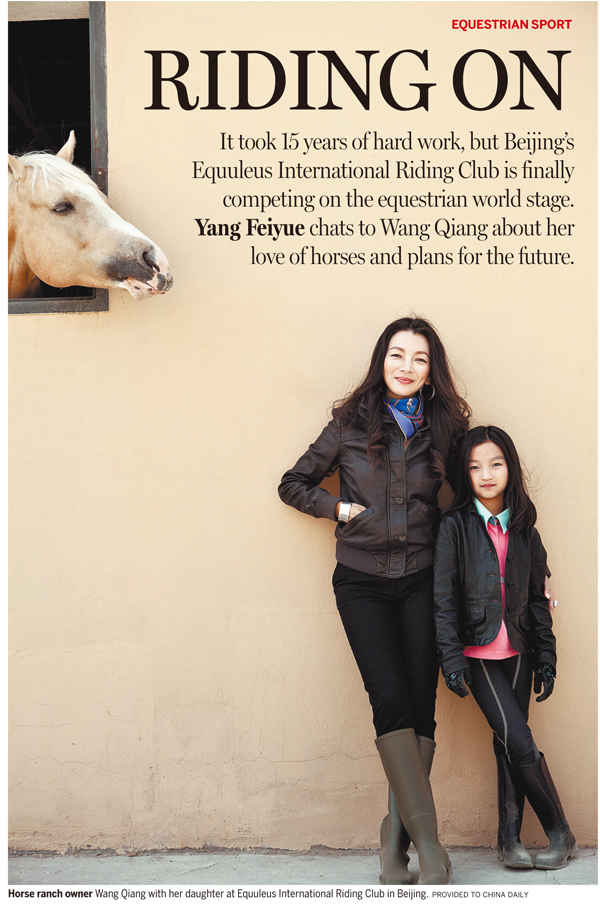By Yang Feiyue(China Daily)
2015-08-21
It took 15 years of hard work, but Beijing's Equuleus International Riding Club is finally competing on the equestrian world stage. Yang Feiyue chats to Wang Qiang about her love of horses and plans for the future.
On Aug 16, fashion magazine editor-turned horse ranch owner Wang Qiang was busy greeting guests at her Equuleus International Riding Club in Beijing.
It was a big moment for Wang - the club was hosting China's first show jumping open, the culmination of 15 years of hard work.
Hosted by the Chinese Equestrian Association, the event was aimed at popularizing equestrian sports in China and giving young Chinese horse riders an opportunity to compete at a high level of sportsmanship.
"China will have a bright future in equestrian sports if more young people are participating," Wang says.
She believes that the popularity of equestrian competitions will play an important role in boosting the sport in China.
Over the past four years, Wang's club has staged about 20 matches every year with the Guangdong-based Camelot Riding Resort and Country Club. Each competition draws 60 to 220 contestants.
Wang has been engaged in horsemanship teaching, match organization, horse purchasing and employee training for a number of years.
Like many amateur horse riders, Wang's first experience with horses was in the Bashang grassland in North China's Hebei province. She first visited the place in 1996, and was soon traveling to the area almost every weekend to ride.
"We usually woke up at about 6 am and rode to Shandian Lake, where we would compete against other horse riders we got to know over lunch," she says.
Wang did not know much about riding techniques at that time and it was only her boldness that gave her the ability to get around on horseback.
Once, she fell off a horse and returned to her office on Monday with a bandage on her head.
"My colleagues laughed at me and said: 'Look, the crazy horse maniac is back'."
Equestrian events involve show jumping, dressage and cross-country. They are one of the few sports that involve close cooperation between a human being and an animal.
"You're in a partnership with your horse, which asks for subtle communications, instead of blind force," she says.
The skills are not the most important part. The key is total trust between two different living creatures, she explains.
"This partnership is also indispensable in our relations with other people," she says. "Equestrian sports have helped me to better understand life."
Wang says horses have given her confidence in dealing with complex problems and have taught her tolerance, loyalty, bravery and responsibility.
Her love of horses led her to quit her job at Cosmo fashion magazine in 2001, when she and her husband took over the club.
At first, things didn't go smoothly. Wang didn't know which official channels could help her to procure horses and how to raise funds for show jumping championships.
One particularly difficult moment was in 2003, when the club was forced to shut down because of the SARS epidemic. All employees had to stay indoors and Wang had to drive out to get supplies for them and the horses.
"Keeping my people and horses healthy was all I wished for at that moment," she says.
But Wang and the club pulled through the difficult period. In 2005, Wang got an opportunity to attend China's 10th National Games' equestrian championship.
She was eager to use the event to increase her club's influence in China.
"I immediately went to Europe to look for horses for the championship, despite being three months pregnant," she says.
She and her team finally chose six horses and had them shipped to China.
The efforts paid off. Her club won fifth place in the championship.
Now, Wang's club focuses on arranging professional matches for horse lovers.
To date, there are 485 professional riders registered with the General Administration of Sports in China, according to the equestrian association.
In Europe and the United States, where equestrian sports are well established, there are about 100,000 to 800,000 skilled riders who participate in various competitions, Wang says.
She hopes more Chinese will get involved in the sport and China's horse riders can win good scores in the international arena in the near future.
In addition to hosting horsemanship contests, Wang's club also meets the UK standards for horsemanship education and testing.
The club has about 200 members who can receive systematic horsemanship training, from horse riding to stable management, horse brushing and habits.
Costs at the club range from 400 to 800 yuan ($63-$125) for each session. The price varies with different coaches and the number of training sessions.
The club is the first in the Chinese mainland to be approved by the British Horse Society.
Last year, it was accredited as a BHS Approved Training and Examination Center, which allows Chinese horsemanship education practitioners to receive an international certificate for preliminary and intermediate teaching tests without traveling abroad for the qualification.
Although equestrian sports remain underdeveloped, Wang believes things are moving toward a promising future.
"We've seen positive changes in people's thinking of the sport, increasing horse imports, continually upgraded technology and more and more high-level equestrian events in China."
